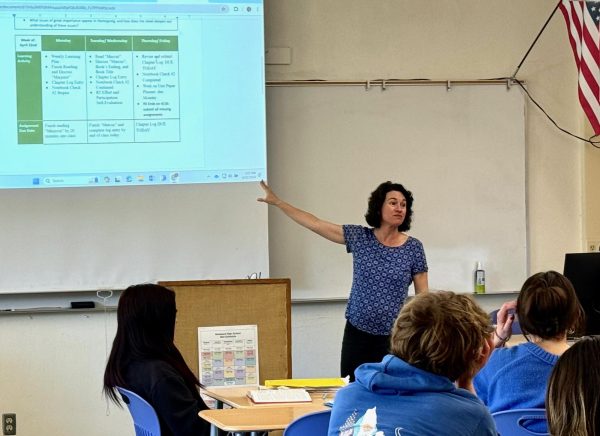Reactions to new double-block schedule vary throughout Redwood community
June 10, 2021

In October 2019, Senate Bill 328 passed, requiring all California high schools to start at 8:30 a.m. or later, effective July 1, 2021. While a new schedule would have been consideredfor next year regardless due to a union agreement, Redwood had to add the required start time and class time minutes to their discussion. As a result, teachers voted on and announced a double block schedule for the next two school years.
The committee of teachers that designed the new schedule consisted of Erik Berkowitz, Anna Farley, Beth de Carion, Maria Civano, Lindsey Kornfeld and Susanne Maxwell. According to Maxwell, an art and history teacher, the committee considered research surrounding the teenage attention span in their selection process, but had a difficult time adhering to the minute requirements.
On March 31, Principal David Sondheim posted a survey on the StudentSquare and ParentSquare apps, asking for input on the schedules. The survey asked participants to rank four schedule options and received a total of 640 responses. The blended schedule was the community favorite and the double-block came in second place. The double-block schedule has also been used by Tamalpais and Archie Williams High Schools for decades and includes 90-minute classes, ten-minute passing periods, one five-minute break and a 35-minute lunch period.
Some teachers are optimistic about the chance to dive deeper into subjects during long class periods and plan on reshaping lessons to do so. Social Studies teacher Lindsey Kornfeld explains that she will rethink her class periods in order to accommodate the needs of students.
“Ninety minutes is a long time, and especially in courses like math or language that require a lot more repetition, it is going to be difficult,” Kornfeld said. “How do you [continue the] best practices and still get through the same number of topics that we traditionally get through?”
Some students are concerned about their learning as well. Junior Sophia Mendoza, who takes several Advanced Placement (AP) classes, believes the longer periods will be a true test of concentration, as the 75 minute periods this year have already been difficult.
“I definitely cannot focus well [during] long periods. I work better when I just focus for a shorter amount of time, and I focus more intensely. With long periods, I always find myself getting distracted and just checking the time every two minutes to see when it’s over,” Mendoza said.
While many are content with the double block, other teachers are worried about the results in terms of efficiency.
“Tam and [Archie Williams’] test scores and ability to get through the same amount of curriculum is far less than we have,” Maxwell said. “There is something about that double block that slows you down. Fortunately in the arts, we can teach with anything, with any of the schedules that are offered. But my concern is that we did not pay attention to the needs of different kinds of learners and what the community said.”
Some students take issue with the fact that on Wednesdays and Fridays, seventh-period classes will end at 3:40, which will push back after-school plans such as athletics, jobs and homework. Junior soccer player Gavin Pierce said the schedules will only work to delay his sleep schedule.
“If practices are starting at four, they are ending at six or seven, that means you’re not going to start on your homework until 8 pm or 9 pm. It’s really disregarding student-athletes,” Pierce said.
Junior Lucas Lammers voiced similar concerns, as the new bell schedule will force him into changing hours at his job
“Being someone who has work after school, on some days it starts at three, so I’d really have to push that back. I don’t know how that’s gonna work,” Lammers said.
The scheduling committee took into account the late end time, and although there was ultimately nothing they could do to shorten it due to strict minute requirements, they chose to incorporate a SMART period at the end of the day on Tuesdays and Thursdays. The goal is that students will be able to get homework done while helping the school reach minute requirements. In addition, the committee hoped that students who have to leave early for sports and jobs will not miss important lessons.
The committee was aware that many students are exhausted by the late afternoon, and both Kornfeld and Maxwell said self-directed work time will increase productivity.
“[By the] last class of the day, you lose focus. You are tired [and] just ready to go home. So if you are not sitting in math, English or history class, listening to somebody speak for a 90 minute period, instead, you are able to get your homework done. I think that is a much better use of our afternoons than having kids try to struggle through this,” Maxwell said.
It is also imperative that students attend the SMART period, as it is state-required minutes. Maxwell warned that if students leave early, the union and school will move the study hall to its current time slot directly after the first period. Other than this small exception, Redwood is mandated to keep the schedule for the next two years.
“The double block [is set] for the next two years. If teachers decide to, a new scheduling committee will be opened up to the staff in two years. And they can go through the same process that we did of proposing new schedules,” Kornfeld said.


















